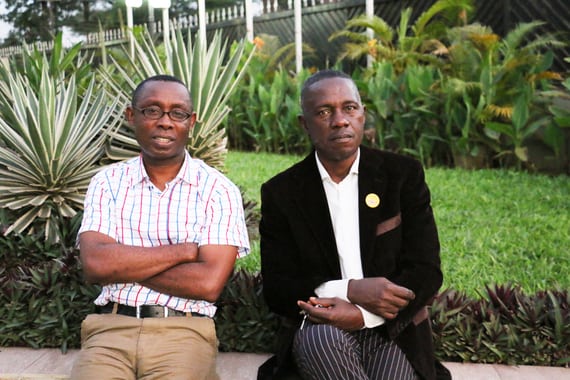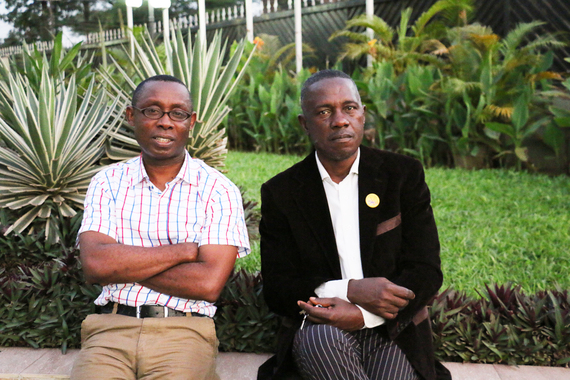Meet Victor Nyoroh and Cyriacus Onwumere of Earthspring International, which advocates for access to health care among women and child inmates of Nigeria’s prison system.
Champions for Change (C4C) is pleased to continue our ‘Meet the Champions’ Series. This bi-monthly blog series highlights the work of 24 Nigerian leaders currently participating as C4C champions. C4C’s Champions in Nigeria are working together to save the lives of mothers, children and young women through innovative advocacy and leadership development. Nigeria is Africa’s largest economy, and yet tens of thousands of women and children die there each year due to lack of maternity care, preventable disease and poor health infrastructure, among other causes. This series brings a diversity of perspectives from around Nigeria to the table to discuss this critical moment in Nigeria’s history and how Nigerians can work together to build a healthy future for all.
Fresh from our second Champions Series advocacy workshop, we continue this week with an interactive discussion with Victor Nyoroh and Cyriacus Onwumere of Earthspring International, an organization which advocates for the highly vulnerable women and children inmates of Nigeria’s prison system by providing access to health care services and coordinating efforts to care for newborns in prison. The organization is headquartered in Kuje, Abuja and implements projects in the FCT, Nassarawa, Benue, Kogi, and Plateau States.
Meet the Champions Series Interview #6
Champions for Change: Tell us a little about yourselves, your personal and educational background.
Cyriacus: I am the second son of a family from Imo State, Nigeria. I completed my university education at Enugu State University, receiving a Bachelor of Science (Honours) in Marketing. I am a Journalist by practice and Publisher of Society Watch Newspaper.
Victor: I am the first-born of five siblings. We were all brought up together by a loving mother and a disciplined, very religious father, now late. I completed my Bachelor of Philosophy and Bachelor of Theology degrees at Bigard Memorial Seminary. I furthered my education with a Bachelor of Law from University of Calabar and a Bachelor-at-Law (B.L) from Nigerian Law School, Lagos, and called to the Nigerian Bar.
Champions for Change: What led to your involvement in RMNCH work? What is the one issue you are most passionate about in the field of RMNCH?
Victor: As a student I was involved in prisons ministry from my church, where we taught moral instructions, English and Mathematics to school drop-outs in prison. On one occasion I learned of the shocking experience of a young woman who had a baby in prison. In my interaction with her, I discovered that she was charged with stealing and had been there for one year, still awaiting trial. Meanwhile, she was her husband’s third wife, with six children. I felt touched by the condition of this mother and her child. This is where my passion to work for RMNCH was ignited. It is what provoked me to balance my pastoral ministry with the study of law so as to be better equipped for future challenges.
Cyriacus: My involvement in RMNCH is rooted in our work in Nigerian prisons, where we have discovered the extent to which women and their newborns experience dehumanization. It moves me with passion to focus on RMNCH issues.
Champions for Change: Why did you opt to be part of the PHI/C4C program? What skills do you hope to acquire and what do you intend to do with this new knowledge?
Cyriacus: I became part of the C4C programme due to their wealth of experience in RMNCH issues. I hope to be made a champion in advocating for women, newborns and children as well as a crusader in RMNCH advocacy training. I wish to acquire stronger leadership skills in RMNCH advocacy, which I will utilize to ensure that the high rates of maternal, newborn and child deaths are reduced in Nigeria.
Victor: I opted to be part and parcel of the C4C programme to improve my skills in advocacy matters and to be better equipped for my work with women and children in prison. I want to make a change, break off from the usual way of doing things regarding the health conditions of women in prison. I am hoping to develop strong leadership skills necessary for challenging the status quo. I want to build a strong organization where there is a passion the issues faced by mothers and children in prison, so that it becomes a national and global reference for successful intervention in the prison world.
Champions for Change: What is the biggest challenge you face in your work?
Victor: My biggest challenge is the socio-cultural prejudices within our society, which feels that prisoners deserve to be punished and not to be corrected or reformed. People see prison as a death sentence. So it is allowable for the incarcerated to be denied basic health rights and services. How to de-prejudice the society on these issues is my greatest challenge.
Cyriacus: My challenges include obtaining funding and dealing with inadequate resources such as staffing and equipment.
Champions for Change: Alternately, what are you most proud of in your professional career?
Victor: As a clergyman on the one hand, I am most proud when I give hope to somebody whose life is on the brink. On the other hand as a legal practitioner, I was once very happy to represent a poor woman in court who’d been charged with a street trading offence and remanded in prison beyond the sentence limit without trial.
Cyriacus: I am always proud to be part of an organization that is dedicated to advocating for women and children on RMNCH issues.
Champions for Change: What is your vision for the future of Nigerian Health System?
Cyriacus: My vision for the future of Nigerian health system is bright because of the newly passed Health Act. When women, newborns and children begin to have access to good quality health services and information, the high rate of maternal and neonatal morbidity will be reduced and they will live healthy, happy lives.
Victor: I want to see a health system that is all-inclusive and comprehensive, where RMNCH is given a top priority, because safe motherhood secures a safe citizenry. No woman should be discriminated against on account of condition, status or location. Whoa! What a healthy and most productive world that would be!
Champions for Change: What is your favorite thing to do when you want to relax and have fun?
Victor: I love to read and listen to cool music. I also like to read local and international news.
Cyriacus: My favorite thing to do when I want to relax is rest and catch up on sleep.
Champions for Change: What is your favorite song?
Cyriacus: My favorite song is Nkwa Praise by Paul Nwokocha.
Victor: It is from R. Kelly: “The storm is over now… I can see the sunshine…”
Stay tuned for the continuation of this series featuring more Nigerian advocates. Meanwhile, we invite you to follow us on Twitter at@C4C_Champions and use the hashtag #MeetTheChampions to engage more closely with the blog series, the work of the 24 leaders whose work is being highlighted, and the larger conversation surrounding reproductive, maternal, newborn and child health in Nigeria.
Champions for Change saves the lives of women and children in Nigeria by empowering local leaders and organizations to improve reproductive, maternal, newborn and child health through advocacy, education, storytelling and strategic partnerships. Champions for Change leverages a program model developed by its sister initiative, Let Girls Lead, which has contributed to improved health, education and livelihoods for more than 3 million girls globally since 2009. This powerful model drives change through the passage of national laws, implementation of programs and distribution of funds to ensure access to quality healthcare, education and economic opportunity.
Champions for Change and Let Girls Lead are headquartered at the Public Health Institute in Oakland, CA, a leader in global health and development for 50 years.



